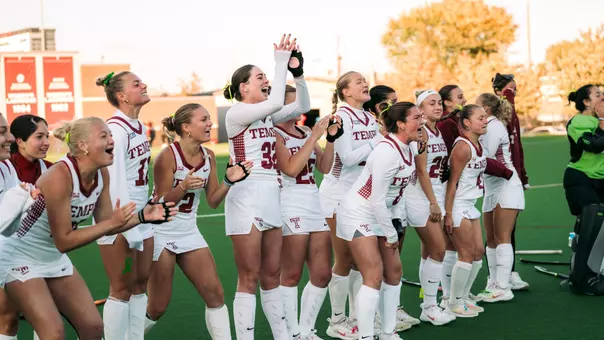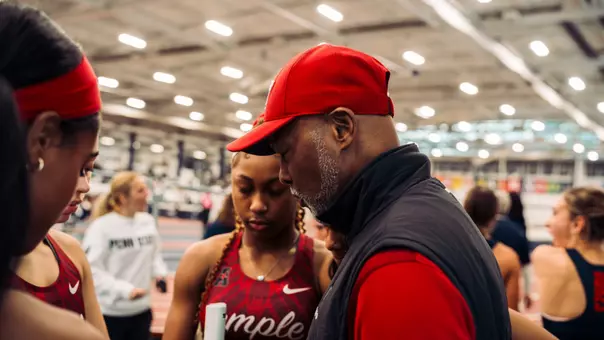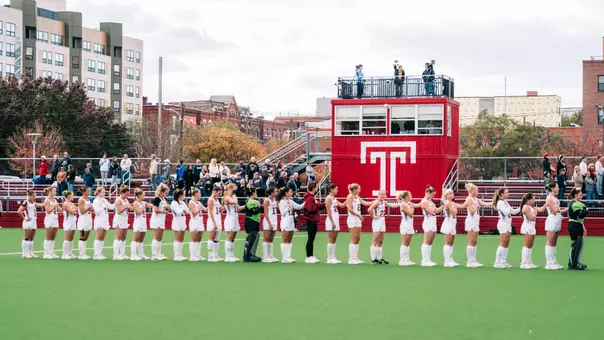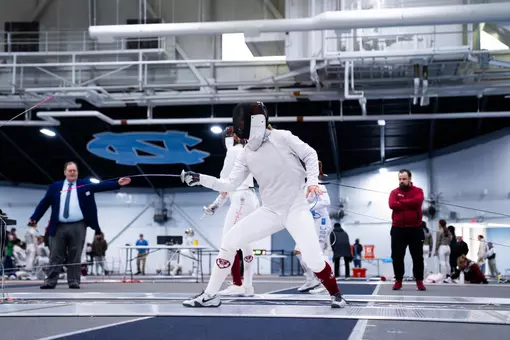Temple University Athletics
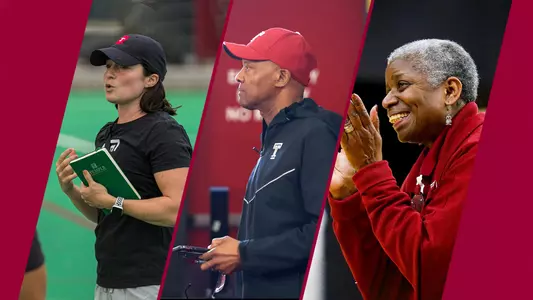
Olympic Experiences: In Their Own Eyes
8.2.24 | Field Hockey, Men's Cross Country, Women's Cross Country, Women's Fencing, Women's Track and Field
Reflecting on their distinguished careers and Olympic experiences, current head coach of track and field/cross country Head Coach Elvis Forde and Head Coach of field hockey Michelle Vittese, and retired fencing Head Coach Nikki Franke offer a unique perspective of the Olympic pageantry and the sacrifice it took to realize their dreams.
For Forde, Vittese, and Franke, the trio have earned six Olympics invitations over a span of three different decades. Coach Franke qualified to compete for the 1976 games in Montreal and 1980 in Moscow, Russia, but did not compete due to the United States boycotting the games that year. Coach Forde ran the 400 meters and was on the 4x400 meter-relay team for his native country of Barbados in 1984 in Los Angeles and 1988 in Seoul, South Korea. Coach Vitesse was the most recent of the three in 2012 in London and 2016 Rio De Janiero, Brazil.
Aspirations don't happen overnight the coaches explained.
For Forde, his friend from Barbados and Seton Hall University, ran at the 1976 Montreal games, aspiring him to take the next step in his journey.
"The year after the games, he came back to Barbados for a track meet when he was running for Seton Hall and I remember seeing him run, and that's when I got motivated to start running."
Franke, however, didn't start fencing until her senior year in high school of 1967.
"I had a teacher from high school starting a fencing club. From there I was convinced to go to Brooklyn College where they had a strong program, and that coach was a member of the 1968 team. So that's where things changed for me." said Franke. "When I came to Temple in 1972, I met Maestro Lajos Csisza the coach over at Penn at the time and a former Olympic coach for Hungary. So, I've had two coaches in my life, and both have been extraordinary and blessed."
Vittese said she was very competitive growing up.
"Ever since I was a young girl, I was insanely competitive with everything that I did, so to be able to get to the Olympics was very profound" explained Vittese. "It was very special to me to have two Olympic experiences, the first one and the second one. The second time around in Rio, I was more seasoned and more experienced."
Vittese and Franke represented the United States in different sports and generations, but for Forde, representing Barbados, his thoughts and memories align just like his colleagues.
"It's insanely special just to have a massive opportunity to be able to represent something far bigger than yourself with very likeminded individuals who are all chasing the same goal as you, said Vittese". "I think there is nothing in the world that can replicate that feeling and that environment."
"You go to competitions, and you start doing well and think to yourself that maybe I have a chance. One thing about fencing which is nice, after some controversy, they developed an objective point system. Now you go to these national tournaments, and you get points, and the team is picked strictly on the points. So once you see yourself in that top group consistently, that's when you think that this could be real." Franke added, when you finally get there, that's the exciting thing. You worked hard for four years. It's exciting and you see all the other top athletes, old friends from other countries."
"I always wanted to be the first person from my country to win a gold medal in the Olympics. When I went off to college (Murray State, later at Southern Illinois), I was running well enough, but for a boycott of the 1980 games, I could have been at third games in Russia." Forde said.
All three leaders had relatable responses when it came to describing their Olympic experiences.
"There's something unique about the Olympic games. It represents the highest level in the world you can get. To hear guys like Lebron James and Steph Curry talk about it, it's like reliving my experiences in my two occasions. The Olympic village is such a wonderful experience because I wanted to be a part of that history and meet a lot of great people.
At the Los Angeles games in 1984, Coach Forde had the chance to meet Michael Jordan and Patrick Ewing of USA Basketball."It's so different than today. The NBA players and the top athletes on the world stage with shoe contracts aren't staying in the village anymore."
The colors, the excitement, the preparation that goes into it from those hosting countries, it makes me still get goosebumps." said Forde. He went on to say, "I also know the sacrifices I made to get there. There just isn't one adjective to describe it all. It was everything expected and more!"
Speaking of opening ceremonies, Forde and Vittese explained their exhilarating experiences.
"You enter with your team and country, but once you get to the stadium you just mingle, you just meet people." said Forde "I got pictures of people from Bahrain, Ghana, and other countries in the world where you exchange medallions. There's a barter system too because some medallions are more valuable than others. Again, those moments in terms of mingling with the world, seeing different people, cultures, attitudes, and the way they dress is so amazing."
Like Forde, Vittesse had a lot of the same memories, but recalls a long day that takes place.
"In 2012 it was amazing. You get to walk with all the Team USA athletes and you're wearing your opening ceremony gear that's tailored for you. It's just like an unbelievable thing. I met Russell Westbrook. Like all of a sudden, you're walking next to someone that's the center attention, but they're there for the same reason that you are." Vittese recalled. "It's very exciting and very empowering for you to see people from other countries. And it's really special because when you walks out, it gets very loud."
"In 2016, our team chose not to walk" explained Vittese. "It's actually a pretty grueling because of the three -to -four -mile walk, and standing for long periods of time, there's nowhere to sit, and you're not provided any relief as an athlete. So, playing in a tournament, every game mattered."
Asked about how they managed life and training for four years leading up to the games.
For Vittese, she said her fitness leading up to her first and second appearances were so different.
"Going into London, I was not as mature, not as responsible, and did not have as much accountability. For Rio, my priorities changed a bit. I fully committed to being a professional athlete and that required me getting my nutrition under control, not drinking anymore, and commited to a far different life than what I was doing before."
She went on to explain to how things are done in the present day for USA Field Hockey.
"The training itself helped us tremendously because they hired a full-time strength conditioning coach to come in. Dave Hamilton, currently of the Tampa Bay Buccaneers, a sports scientist worked with the performance analysts helped us prepare to get us to our physical peak"
In the 1980's, Forde detailed on how he just managed to get things done.
"When you have dreams and aspirations, you figure out how to get things done. You figure out a way and it just happens for you." said Forde. "You got to find the right people to help you along. I got fortunate because once I finished college, I was able to join a club that was sponsored by Nike and I got my rent paid, medicals paid, plus being one of the top athletes, you get a little bit extra."
Coach Franke says the times are different today than they were years ago.
"It was different. You had to pay for your own travel, your coach, your training, and entry fees back then. Now it's different, the top athletes get stipends. I was fortunate, my coach knew I was student, and so he didn't charge me anything and I was able to train.
In the end, Forde, Franke, and Vittese memories that nobody can take away their Olympic experience.
With a smile on his face, Forde said, "In 1984, I remember walking out onto the Coliseum floor before the semifinals of the 4x4 and I'm walking on the straight away and I'm focused on everything I want to do. I remember hearing this voice in the stadium. Still to this day I remember hearing, "Let's go Southern Illinois Salukis!" Of all those thousands of people, I heard that. Later I found out that it was a professor at SIU and lived across from my SIU coach!"
It wasn't the competition that Franke recalls but rather the chills she got walking into Montreal's Olympic Stadium for that first time and conversation she had with an Olympic superstar.
Franke struck up a conversation with Madeline Manning-Mims, the 1968 gold medal winner in the 800 meters, the first African-American woman to compete in the event, and still do this day remains the only American woman to win gold in the event.
"I'll never forget, she was very well known, she was famous, she was a star. We were on a bus going to some event. She and I were there, and I was in ah. I will always praise her because she gave me her whole attention like I was the one that was important. She really listened. We had a wonderful conversation, and I couldn't believe she was talking to me. I compare it to the Maya Angelou saying, "people don't remember what you do, but they remember how you make them feel.""
Vittese says she can't recall just one thing, but said, "The overall joy you get from being able to finally get there since you've put in all the blood, sweat and tears."
For Forde, Vittese, and Franke, the trio have earned six Olympics invitations over a span of three different decades. Coach Franke qualified to compete for the 1976 games in Montreal and 1980 in Moscow, Russia, but did not compete due to the United States boycotting the games that year. Coach Forde ran the 400 meters and was on the 4x400 meter-relay team for his native country of Barbados in 1984 in Los Angeles and 1988 in Seoul, South Korea. Coach Vitesse was the most recent of the three in 2012 in London and 2016 Rio De Janiero, Brazil.
Aspirations don't happen overnight the coaches explained.
For Forde, his friend from Barbados and Seton Hall University, ran at the 1976 Montreal games, aspiring him to take the next step in his journey.
"The year after the games, he came back to Barbados for a track meet when he was running for Seton Hall and I remember seeing him run, and that's when I got motivated to start running."
Franke, however, didn't start fencing until her senior year in high school of 1967.
"I had a teacher from high school starting a fencing club. From there I was convinced to go to Brooklyn College where they had a strong program, and that coach was a member of the 1968 team. So that's where things changed for me." said Franke. "When I came to Temple in 1972, I met Maestro Lajos Csisza the coach over at Penn at the time and a former Olympic coach for Hungary. So, I've had two coaches in my life, and both have been extraordinary and blessed."
Vittese said she was very competitive growing up.
"Ever since I was a young girl, I was insanely competitive with everything that I did, so to be able to get to the Olympics was very profound" explained Vittese. "It was very special to me to have two Olympic experiences, the first one and the second one. The second time around in Rio, I was more seasoned and more experienced."
Vittese and Franke represented the United States in different sports and generations, but for Forde, representing Barbados, his thoughts and memories align just like his colleagues.
"It's insanely special just to have a massive opportunity to be able to represent something far bigger than yourself with very likeminded individuals who are all chasing the same goal as you, said Vittese". "I think there is nothing in the world that can replicate that feeling and that environment."
"You go to competitions, and you start doing well and think to yourself that maybe I have a chance. One thing about fencing which is nice, after some controversy, they developed an objective point system. Now you go to these national tournaments, and you get points, and the team is picked strictly on the points. So once you see yourself in that top group consistently, that's when you think that this could be real." Franke added, when you finally get there, that's the exciting thing. You worked hard for four years. It's exciting and you see all the other top athletes, old friends from other countries."
"I always wanted to be the first person from my country to win a gold medal in the Olympics. When I went off to college (Murray State, later at Southern Illinois), I was running well enough, but for a boycott of the 1980 games, I could have been at third games in Russia." Forde said.
All three leaders had relatable responses when it came to describing their Olympic experiences.
"There's something unique about the Olympic games. It represents the highest level in the world you can get. To hear guys like Lebron James and Steph Curry talk about it, it's like reliving my experiences in my two occasions. The Olympic village is such a wonderful experience because I wanted to be a part of that history and meet a lot of great people.
At the Los Angeles games in 1984, Coach Forde had the chance to meet Michael Jordan and Patrick Ewing of USA Basketball."It's so different than today. The NBA players and the top athletes on the world stage with shoe contracts aren't staying in the village anymore."
The colors, the excitement, the preparation that goes into it from those hosting countries, it makes me still get goosebumps." said Forde. He went on to say, "I also know the sacrifices I made to get there. There just isn't one adjective to describe it all. It was everything expected and more!"
Speaking of opening ceremonies, Forde and Vittese explained their exhilarating experiences.
"You enter with your team and country, but once you get to the stadium you just mingle, you just meet people." said Forde "I got pictures of people from Bahrain, Ghana, and other countries in the world where you exchange medallions. There's a barter system too because some medallions are more valuable than others. Again, those moments in terms of mingling with the world, seeing different people, cultures, attitudes, and the way they dress is so amazing."
Like Forde, Vittesse had a lot of the same memories, but recalls a long day that takes place.
"In 2012 it was amazing. You get to walk with all the Team USA athletes and you're wearing your opening ceremony gear that's tailored for you. It's just like an unbelievable thing. I met Russell Westbrook. Like all of a sudden, you're walking next to someone that's the center attention, but they're there for the same reason that you are." Vittese recalled. "It's very exciting and very empowering for you to see people from other countries. And it's really special because when you walks out, it gets very loud."
"In 2016, our team chose not to walk" explained Vittese. "It's actually a pretty grueling because of the three -to -four -mile walk, and standing for long periods of time, there's nowhere to sit, and you're not provided any relief as an athlete. So, playing in a tournament, every game mattered."
Asked about how they managed life and training for four years leading up to the games.
For Vittese, she said her fitness leading up to her first and second appearances were so different.
"Going into London, I was not as mature, not as responsible, and did not have as much accountability. For Rio, my priorities changed a bit. I fully committed to being a professional athlete and that required me getting my nutrition under control, not drinking anymore, and commited to a far different life than what I was doing before."
She went on to explain to how things are done in the present day for USA Field Hockey.
"The training itself helped us tremendously because they hired a full-time strength conditioning coach to come in. Dave Hamilton, currently of the Tampa Bay Buccaneers, a sports scientist worked with the performance analysts helped us prepare to get us to our physical peak"
In the 1980's, Forde detailed on how he just managed to get things done.
"When you have dreams and aspirations, you figure out how to get things done. You figure out a way and it just happens for you." said Forde. "You got to find the right people to help you along. I got fortunate because once I finished college, I was able to join a club that was sponsored by Nike and I got my rent paid, medicals paid, plus being one of the top athletes, you get a little bit extra."
Coach Franke says the times are different today than they were years ago.
"It was different. You had to pay for your own travel, your coach, your training, and entry fees back then. Now it's different, the top athletes get stipends. I was fortunate, my coach knew I was student, and so he didn't charge me anything and I was able to train.
In the end, Forde, Franke, and Vittese memories that nobody can take away their Olympic experience.
With a smile on his face, Forde said, "In 1984, I remember walking out onto the Coliseum floor before the semifinals of the 4x4 and I'm walking on the straight away and I'm focused on everything I want to do. I remember hearing this voice in the stadium. Still to this day I remember hearing, "Let's go Southern Illinois Salukis!" Of all those thousands of people, I heard that. Later I found out that it was a professor at SIU and lived across from my SIU coach!"
It wasn't the competition that Franke recalls but rather the chills she got walking into Montreal's Olympic Stadium for that first time and conversation she had with an Olympic superstar.
Franke struck up a conversation with Madeline Manning-Mims, the 1968 gold medal winner in the 800 meters, the first African-American woman to compete in the event, and still do this day remains the only American woman to win gold in the event.
"I'll never forget, she was very well known, she was famous, she was a star. We were on a bus going to some event. She and I were there, and I was in ah. I will always praise her because she gave me her whole attention like I was the one that was important. She really listened. We had a wonderful conversation, and I couldn't believe she was talking to me. I compare it to the Maya Angelou saying, "people don't remember what you do, but they remember how you make them feel.""
Vittese says she can't recall just one thing, but said, "The overall joy you get from being able to finally get there since you've put in all the blood, sweat and tears."
Ep. 38: Head Gymnastics Coach Hilary Steele
Friday, February 13
Ep. 37: Lacrosse Student-Athlete Sarah Gowman
Friday, February 13
Ep. 36: National Girls & Women in Sports Edition!
Friday, February 06
Temple Men's Basketball 2025-26 All Access | Game 22 WHITE OUT VS USF
Tuesday, February 03


